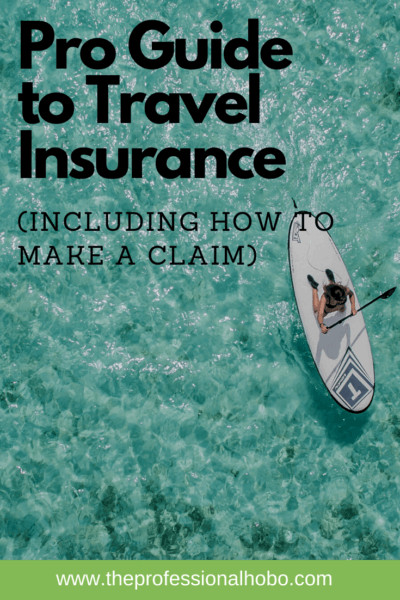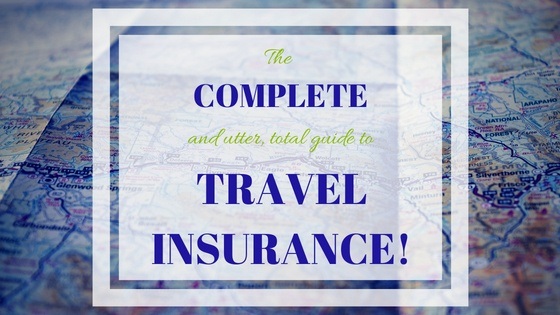It’s important to protect yourself financially while you travel. I talk about this in my guides to Travel Security and Traveling With Money.
But what if a personal accident, theft, or something else should strike despite taking all the proper security precautions? This is where travel insurance comes into play.
But what is travel insurance, anyway?
There are several different types of traveling insurance, not to mention different insurance companies and policy options. It can be pretty overwhelming.
In this guide, I’m going to walk you through all the different types of travel insurance and when you might need them, so that you can choose the right ones for you.

Table of Contents:
Chapter 1: What is Travel Insurance and Why Do You Need It?
Chapter 2: The Difference Between Travel Insurance and Expat Insurance & When You Need Each
Chapter 3: Tips for Structuring Your New Travel Insurance Policy
Chapter 4: Glossary of Travel Insurance Terms
Chapter 5: How to Make a Successful Insurance Claim
Chapter 6: Protecting Your Valuables with Property Insurance
Chapter 7: Travel Insurance You May Already Have With Your Credit Card

Chapter 1: What is Travel Insurance and Why Do You Need It?
Almost categorically, I will advise that you need travel insurance while abroad. Why? Because you just never know when something will happen, and how dramatic (and costly) it will be when it does.
It’s Happened To Me
In my first two years on the road, my ex landed in hospital twice. Once because he broke his toe in Hawaii (a 45 minute exercise in x-rays and tylenol, costing $900), and the second time for a week in Thailand while he fought for his life against a rough case of Dengue Fever.
Neither occurrence could have been anticipated, nor particularly afforded. And although making claims wasn’t easy (especially in Thailand, when onward travel tickets were cancelled and re-issued, visas extended, and a myriad of both out-patient and in-patient expenses incurred; see Chapter 5 for lessons learned), we were happy to have the security blanket of insurance protecting us against these unforeseen emergencies.
Different Types of Traveling Insurance
Not all types of travel insurance are created equal, cost-effective, or even necessary.
Trip Cancellation Insurance
Trip Cancellation Insurance is designed to refund you all or part of your normally non-refundable travel costs in case of a personal or family medical emergency. It’s usually offered to you right when you book your flight, and is not always available after the ticket is purchased.
There are always lots of stipulations and conditions around the coverage, but it might be worth it if it’s an expensive trip with long-haul flights.
Baggage Loss/Theft Insurance
Baggage Loss/Theft Insurance covers all or some of the value of your travel belongings if they are lost, stolen, or damaged. Read the fine print before you buy this kind of insurance! The requirements to make a claim, valuation formula, and even acceptable circumstances for making a claim vary greatly.
All in all, this type of insurance tends to be more hassle than it’s worth unless you’re traveling with expensive stuff (which may not even be covered). You may even already have this coverage with a credit card or other type of existing insurance (see Chapter 7).
Emergency Medical Travel Insurance
Emergency Medical Travel Insurance covers or reimburses you for unexpected medical expenses while you travel. It’s also the most commonly purchased, and probably the most practical type of travel insurance on the market.
In the case of accidents, some policies cover sports like scuba diving and skydiving while others don’t. What you were doing when you were injured, and where, are often important things to medical travel insurance companies.
If you are visiting certain locations in political turmoil or if you get hurt in a terrorist incident, you might also not be covered by some plans. It’s always important to read the fine print and make sure the things you want covered are covered.
All that aside, this type of insurance can be worth a lot to you if you fall ill or are in an accident. Trust me; it has come in handy for me multiple times over the years.
Expat Insurance
Full-time and long-term travelers may not qualify for regular travel insurance after they’ve been traveling for long enough. For example, for Canadians to qualify for travel insurance, they must have valid provincial coverage as a base. But if you are out of the country for too long, you lose that provincial coverage, and thus can’t get travel insurance any more.
In this case, we look to Expat Insurance, also called International Health/Medical Insurance or Worldwide Travel Insurance. It offers comprehensive medical insurance internationally, and is tailor-made for expats and long-term/full-time travelers. For more details about expat insurance, check out my detailed guide.
2024 Update: Expat insurance has come a long way with the increase in long-term travelers and digital nomadism. Safety Wing offers travel insurance for long-term travelers and remote workers – and it covers pandemics! Check out my Complete Guide to Travel Medical Insurance which features Safety Wing and other digital nomad-friendly insurance providers.
Chapter 2: The Difference Between Travel Health Insurance and Expat Insurance & When You Need Each
Which insurance for travel do you need – expat insurance or travel insurance – to cover your medical needs while abroad?
To help discern the differences and structure the right policy for your needs, I chatted with David Tompkins of Expat Financial, an international insurance brokerage that sources travel insurance, expat insurance, and other insurance needs for people living abroad.
Who Needs Travel Health Insurance?
“Someone who is traveling for a year or less. Some travel insurance plans can cover you up to two years, but remember that travel insurance will only cover emergency claims and will not cover you back in your home country,” says Tompkins.
He also suggests that you maintain your health coverage back home (since most travel insurance policies don’t cover you in your home country).
Who Needs Expat Insurance?
“The perfect candidate for international health insurance [expat insurance] is someone who is traveling or living abroad for more than 12 months,” says Tompkins. It’s a comprehensive medical insurance policy providing coverage around the world. “An international health insurance plan will provide both emergency and non-emergency care both abroad and possibly back home.”
Americans: You May Only Need Medical Travel Insurance
As a Canadian, I stopped qualifying for travel insurance once my provincial health coverage ran out (which happened after I was absent from Canada for a certain amount of time). But this isn’t the case all over the world. My understanding is that readers from the U.S. can perpetually qualify for travel insurance if they simply wish to have emergency travel coverage (rather than a full international health plan, as expat insurance provides).
One option for Americans that offers travel insurance policies up to 364 days a year is Travelex. They stand out because unlike most insurance companies, Travelex has no age limit, which makes it perfect for seniors.
Travel/Expat Insurance Companies I’ve Used
If you’re shopping for Expat Insurance and don’t know where to start, I can tell you that I had my policy with IMG Global (my specific plan is called IMG Global Medical). IMG has lots of insurance options for all types of travelers. If you’re interested, please send me an email through the contact page and I can introduce you to my broker who can set you up with the right policy for you.
For standard Travel Insurance, I’ve used World Nomads, which is a cost-effective, complete policy that is easy to apply for and renew even if you’ve started traveling. (This is really important, as many travel insurance policies don’t allow you to apply for or extend your coverage while abroad).
HOWEVER, if you’re Canadian and have been out of the province long enough for your provincial health coverage to lapse (usually around 6 months), then World Nomads coverage limits drop dramatically. (Also, in recent years I’ve noticed their rates aren’t all that competitive).
There are two solutions I’ve been using, one of which is Safety Wing. They offer travel medical insurance that can be applied for and renewed from abroad indefinitely. Here’s a ton of info about all their plans (including pros & cons), and play with the widget below to get a quote for their travel insurance.
I’ve also more recently been using Genki, which is even easier to apply for an understand, has no coverage limits, and offers more comprehensive sports coverage.
The above companies may not be right fit for you depending on your destination, trip length, age, and medical requirements. Visitors Coverage is a broker that can source multiple quotes for you. Check it out:
Chapter 3: Tips for Structuring Your Policy
Regardless of whether you choose travel or expat insurance, here are some tips:
Evacuation and Repatriation
Tompkins highly recommends “obtaining a plan that includes evacuation and repatriation care, especially if you are residing or traveling in a developing country with limited medical facilities.”
I can attest to this, having been at the mercy of the insides of a few hospitals in my own travels.
Pre-Existing Conditions
Most insurance policies exclude any coverage that is related to pre-existing conditions (see Chapter 4 for a glossary of terms to learn more about Pre-Existing Conditions). If there are complications or related illnesses/injuries on the road, this could result in a pricey bill for you. Tompkins says a solution to this is to “try to obtain a policy that can underwrite you medically and potentially cover your medical condition for an extra fee.”
Pregnant, or Planning to Be?
Travel insurance plans won’t cover pregnancy-related medical visits or illnesses, but “an international health plan [expat insurance] may cover pregnancy coverage after you have owned the policy for 12 months.” (In other words, with a 12-month waiting period, you would need to have the policy in place for a year before you become pregnant).
Choose a Reputable Company
“Make sure you get a policy with a large and secure insurance company that will stand behind their coverage and be able to process your future claims,” suggests Tompkins. Look for a company with long history and a secure financial rating, read the policy and terms to ensure they cover things like direct reimbursement to hospitals, and search for online reviews to see how the customer experience is.
Use a Broker
I can attest to the virtues of using a broker; they tend to work with reputable insurers, and can source a policy that best meets your needs. They will also help you with the application, renewal, and sometimes even the claims process.
I haven’t used Expat Financial, but I do see that they represent three insurance companies that I’ve had policies with before, so they seem to have their bases covered. Personally I have used Ingle Insurance and Pacific Prime.
And don’t worry, you don’t pay a fee to use a broker; they are compensated by the insurance companies.
Expat-Specific Tips
If you know expat insurance is the one for you, keep in mind the following:
Vision, Dental, and Extras
“Some expat health plans will also provide the option of obtaining dental and vision care,” says Tompkins. Some of these beefed-up plans also include some coverage for services like massage and physiotherapy.
But remember, the more plush the plan is, the higher your premiums will be. Need for, availability, and cost of these services depends on where you are traveling/living.
I tend to structure the most basic policy I can find to cover me in emergency or costly medical situations (with a high deductible to keep premiums low), and I take care of minor medical needs and doctors’ visits with cash (here’s a comparison of what I’ve paid to see a doctor in a few countries).
Including/Excluding USA
Many expat health insurance plans give you an option to include or exclude coverage if you are traveling/living in the USA. “Medical costs are quite high in the United States and many plans will provide you the option of excluding medical care in the USA, which helps reduce the premiums,” suggests Tompkins.
One of the expat insurance plans I owned excluded USA coverage; I justified it in knowing I could buy a small dedicated travel insurance policy covering any time I’d spend in the USA, and I would still save money off the yearly global plan.
(The policy I had with IMG Global has really attractive global rates – including USA coverage).
What Happens to Your Premiums Over Time
Contrary to auto insurance (which rewards no claims with discounted premiums), expat insurance premiums will go up over time. Tompkins says “the average health inflation rate is 10-15% depending on the insurer. Most individual health plans [premiums] are not impacted by your own health claims, but are affected by the claims experience that the insurer is facing in any given year”.
PRO-TIP: After swallowing these rate increases with IMG each year for about five years, I had a peek at current rates as if I was buying the very same policy for the first time. Even with my increase in age, the market rates were significantly lower than what I was paying. So, I applied for a brand new policy at the lower rate, and once I qualified, I cancelled my existing policy.
This is common practice in the insurance industry, and is referred to as a “policy replacement”. The downside to replacing your policy is that you will have to go through the standard “waiting period” (for things like pregnancy coverage and pre-existing conditions) all over again. The upside (in addition to lower rates) is that you may potentially be reconsidered for any exclusions imposed on your existing policy. This happened to me; my exclusion for asthma-related conditions (related to something that happened when I was a teenager) was deemed unnecessary and removed from the new policy.

Chapter 4: Glossary of Travel Insurance Terms
Whenever you get into a hairy topic like insurance for travel, it’s important to know the jargon and important terms that you’ll come across so that you can confidently choose the right policy for your situation.
Here’s a glossary of some terms you need to know to get started.
Benefit Amount
The money (benefit) that’s paid to you in the event of a claim.
Beneficiary
Somebody who receives money (usually the person receiving a life insurance payout if you die).
Claim
You “have a claim” or are “filing a claim” if you are applying to the insurance company to for a payout (benefit) in the event of receiving medical care that’s covered under the policy.
Co-Pay/Co-Insurance
Co-paying is having to pay a percentage of the medical expense yourself (not to be confused with a deductible, below). It’s usually 10-20% of the total cost, up to a limit.
For example: You incur $1,000 in medical expenses. If the co-pay/co-insurance amount is 10%, you pay $100, and the insurance company pays the remaining $900.
Deductible
Before the insurance company covers anything (even on a co-insurance basis), they can require that you pay a deductible, which means you pay for the first portion of expenses.
For example: You incur $1,000 in medical expenses, and have a $250 deductible. You’ll pay the $250 deductible, then the remaining $750 is shared between you and the insurance company dependent on your co-insurance deal (ie: you co-pay 10%, which is $75).
Watch out for the fine print about deductibles; some are per policy year, and some are per claim or medical provider. If you have multiple claims (which is possible on a more comprehensive policy that covers regular doctor/physio/chiropractor/etc visits), then you could end up paying a deductible many times over before qualifying for any reimbursement.
Emergency Medical Evacuation
If medical care is unavailable or inappropriate, an emergency medical evacuation benefit will cover the cost to get you to a place where you can receive the treatment you need, or even back home if it’s deemed reasonable by the insurance company. This can be horrifically expensive once you’re looking at things like medical helicopters, so you usually see large benefit amounts allotted for this clause.
Exclusions
Policy exclusions are things that aren’t covered. They can either be pre-existing conditions (see below), or injuries as a result of certain activities you participate in (like skydiving or scuba diving), or claims resulting from being in war-torn or politically unstable regions.
Inpatient vs. Outpatient
An inpatient is somebody who has been assigned a hospital bed, even if it’s only for a day visit. Outpatients are everybody else. Some basic emergency medical policies only cover for inpatient expenses, which can be quite exclusive, so watch out.
Pre-Existing Conditions
If the application process involves a medical questionnaire, they’re looking for pre-existing conditions, and if you have one, they’ll often refuse to cover you for future related incidents. I had exercise-induced asthma for a short time when I was 16 years old, which – more than 20 years later – led to an exclusion on any claims related to asthma. Go figure.
Even if the policy doesn’t have a medical questionnaire, a pre-existing condition is something that you knew about or had symptoms of prior to your application. Some policies exclude all pre-existing conditions for the first 2 years. So if you make a claim for a heart attack within 6 months of getting a policy, and the insurance company finds out that you saw a doctor 3 months before applying for the policy with complaints of chest pain, it’s a pre-existing condition and you might not be covered.
Premium
The money you pay the insurance company for coverage.
Repatriation
Sending your body back home to your family if you die abroad.
Chapter 5: How to Make a Successful Insurance Claim
Insurance companies aren’t inherently evil! In fact, if you have a legitimate claim, your insurance company could save you from financial ruin. But….if you need to make a claim, you may have to fight for it.
When my partner (at the time) was in the hospital with Dengue Fever in Thailand, we had a pretty complicated claim that included medical tests prior to hospital admission, the hospital stay, extending our visas, canceling our onward travel tickets, buying new onward travel tickets, and more. I learned a lot about what it takes to make a successful travel insurance claim through that experience.
Here’s a step-by-step guide to ensure you get what you deserve in the claims process:
Step 1: Read Your Insurance Policy
It may be soul-destroying work, but read your policy cover to cover. It could make or break you if and when you need to make a claim.
Step 2: Call the Insurance Company
Most travel insurance fine print dictates that you must call the insurance company immediately, and if at all possible, before you seek treatment. If you don’t, you might end up going to a medical facility they don’t support, or you might not be eligible for any direct reimbursement that most insurers can provide to certain medical facilities (meaning you don’t have to be out of pocket for the expense).
Step 3: Make Copies of Everything
When making claim for reimbursement of expenses you’ve paid, you will probably have to mail them your original receipts. If you don’t retain copies, you may not remember (or be able to prove) what you’re owed. If the originals are lost in transit, or if the claim isn’t processed properly, you will need these copies as a reference.
I had a stack of receipts and paperwork for my partner’s insurance claim; so much so that I included a “table of contents”! Thank goodness I did, because the insurance company muddled up the claim badly, and with my collated copies in front of me, I was eventually able to sort out the confusion while on the phone with them, by referencing specific page numbers to ensure we were (literally) on the same page.
Step 4: Review Reimbursements
Whether through negligence or simple omission, insurance companies don’t always get things right. One of my onward travel tickets was in Malaysian Ringgit, while the majority of the other expenses was in Thai Baht. Thus, they reimbursed me for that expense in Thai Baht insead of Ringgit – which ended up being about 10 times less than what I should have received.
Step 5: Be Prepared to Fight (Nicely)
I was flabbergasted when I called the insurance company to point out their currency conversion mistake, and was told flat out that it wasn’t their problem. For this issue, as well as some other expenses that they refused to cover (but should have), I had to speak to many managers (and managers’ managers).
Being irate doesn’t help anybody; stay upbeat and explain the situation as many times as necessary. If you’re in the right, eventually, they will listen.
Step 6: Be Patient
The entire travel insurance claims process from beginning to end requires a heroic dose of patience. Reimbursements for my claim came in trickles, as if each minute aspect of my claim was processed by a different department. When the reimbursements did come in, some of them were wrong, which required even more patience (and a lot of time!) in sorting it out on the phone.
All in all, it took months to resolve. But the claim was for a hefty amount of money, and that’s what travel insurance is for. While the claims process can be infuriating, and while there’s a school of thought that suggests insurance companies are designed to wear you down so they don’t have to pay out, your patience and persistence is probably better than the alternative: a medical bill that you can’t afford.

Chapter 6: How to Protect Your Valuables While You Travel with Property Insurance
One of the biggest risks you face on the road is that of theft/loss/damage of your personal valuables. You are vulnerable from all sides when you travel, so you need to be especially attentive to where and how you carry your valuables.
For the first few years of my full-time travels, I didn’t have any property insurance. But when I upgraded my laptop and acquired a few higher-value items to accompany me on my journey, I started becoming consumed by a fear of these items being damaged or stolen.
Enter from stage left: Property Insurance.
The problem is, property insurance is probably one of the hardest forms of insurance to claim on (similar to baggage loss/theft insurance). No insurance claim is easy (trust me – I’ve been there; did you read Chapter 5??), but when it comes to property and valuables, insurance companies are very adept at finding ways to not pay out.
However you can beat them at their own game, if you’re organized.
Advice for Property Insurance Claims
If you can irrefutably prove that you bought Item X, and can illustrate that you owned and used it before it was damaged/stolen, then there isn’t much they can say. Cheque please!
- Keep original receipts of major items you have insured.
- Take pictures of the items – and pictures of you using them.
- And of course, if the insured item in question is your laptop and all these pictures and receipts are stored on it, then make sure you have a backup in case it’s the laptop that goes missing.
Choosing Property Insurance for Travelers & Expats
Through some fellow travelers, I learned about Clements Insurance which is geared towards expats, providing various forms of insurance to those living or traveling abroad.
Their International Personal Effects Insurance wasn’t prohibitively expensive, and gave me peace of mind that if my laptop (for example) went missing I wouldn’t be immediately on the hook for an expensive replacement bill.
It’s their transit coverage that makes it effective for long-term travelers on the move. And don’t be put off by their requirement for a mailing address in a country other than your own (thus showing that you are in transit or are an expat); I used a friend’s address in Sweden to receive the initial paperwork, and all future correspondence was handled online.
If you are a short-term traveler, check out your existing renters’ or homeowners’ insurance plans, as they might provide coverage for your items while you’re traveling.
As with all insurance, read the (mind-numbing) fine print to ensure you understand the coverage and what you need to do to make a successful claim – before you need to make a claim.
Clements Insurance is the only insurance company I’m aware of that offers international property insurance suitable for travelers.
Chapter 7: Travel Insurance You Already Have With Your Credit Card
When you make certain travel reservations with your credit card, you may automatically get travel insurance, potentially saving you hundreds of dollars. Below are two forms of automatic credit card insurance – along with factors to consider and questions to ask.
Flight, Baggage, & Trip Cancellation Insurance Through Your Credit Card
When you pay for your flight with your credit card, you may be entitled to any or all of the following forms of insurance:
- Trip Cancellation Insurance: Entitles you to a full or partial refund of costs to cancel or change your trip due to a personal or family emergency.
- Flight Delay Insurance: Provides an allowance if your flight is unduly delayed.
- Baggage Loss/Delay/Theft Insurance: Recoups the costs of replacing your baggage, or a stipend to cover you if your baggage is delayed. Coverage amounts are often limited, with stipulations (like no camera coverage).
Many airlines have relationships with insurers and will offer you this insurance directly when you buy your flight; if you have it through your credit card, you can confidently decline.
Generally, the above insurances are rife with conditions and difficult to claim on. I would only purchase them outright if the trip involved expensive flights and severe financial consequences to cancel.
But if I’m covered automatically through my credit card, all the better.
Questions to Ask Your Credit Card Company About Travel Insurance
Coverage levels vary by credit card. Your credit card terms and conditions should provide most of the information you require. Read it and see if you can answer the questions below. If not, call your credit card company to ask the following:
- What forms of travel insurance do you provide?
- What do I need to do to qualify? (eg: pay for the trip in full with the card)
- Does it cover people traveling with me?
- What are the limitations and exceptions?
- What is the maximum amount of coverage?
- What is the maximum length of trip covered?
- For a medical emergency, are pre-existing medical conditions covered? Does age affect coverage?
- What insurance company you are working with, and what is their contact information?
- What do I do in the event of a claim, and what will I need to provide?
Please note that Accidental Illness/Injury (Medical) Insurance is not provided through your credit card; this is a separate – and important – form of travel insurance.
Car Rental Insurance Through Your Credit Card
Car rental agencies always offer Third Party Liability and Collision/Loss/Damage Insurance. These sneaky last-minute expenses can double your rental costs.
Good news! When you use your credit card to pay for the rental, you might receive automatic collision/loss damage insurance. Third party liability and personal injury insurance is rarely covered (although you might have it on your personal auto insurance policy).
Questions to Ask Your Credit Card Company About Car Rental Insurance
Again, consult your credit card terms and conditions, and ask the following questions:
- What countries am I covered in?
- What is the maximum rental period covered?
- What kind of vehicles are covered, and what is the maximum value?
- What types of coverage are offered? (collision/loss/damage, personal accident, third party liability)
- What is the deductible?
- Who is insured to drive? (Often only the cardholder is covered)
- Are there age restrictions?
- Are there any types of roads that I can’t drive on?
- Who is the insurance company, and what is their contact information?
- What do I do in the event of a claim?
Other Travel Insurance You Might Already Have
Some of your other insurance policies might provide travel coverage. Check for the following:
Health/Medical Insurance
- Personal accidents/injuries/illness while traveling
- Repatriation to your home country for treatment
Rental/Homeowner’s Insurance
- Baggage loss/theft
- Personal items stolen from a rental car
Auto Insurance
- Personal items stolen from a rental car
- Personal injuries from a rental car accident
- Third party liability for rental cars
In all cases, ask your existing insurers about the level and availability of coverage.
Between your credit card and existing insurance policies, you could save yourself some serious money on travel insurance.
So there’s everything you need to know to choose the right travel insurance plan for you.
What about you? What’s been your experience with travel insurance? Was the guide helpful?
Let me know in the comments below!





Another informative article!
Insurance that covered a skydiving accident? I had to think about that one for a second or two… 🙂
Rob,
Now, now. As somebody with almost 300 skydives under my belt, I feel compelled to inform you that a parachute not opening is not the only form of skydiving accident that can happen! In fact, it’s right up there next to “ain’t-gonna-happen”. Messing up the landing and twisting your ankle, however…..damn near guaranteed at some point in the game. 😉
To someone who doesn’t jump out of a functioning aircraft for fun, the thought of the parachute not opening is the first one that comes to mind but I can see thinking about breaking my leg after the chute opens … 🙂
Lol! Indeed many people cannot say that they’ve been skydiving for years and never hurt themselves, but as someone (who was one of your long ago coaches) who’s made over 6,500 skydives, been on three world records and has two Canadian national gold medals in the sport, my proudest achievement in the sport was none of those things. It’s the fact that I never once hurt myself. I never had so much as a twisted toenail. That, I’m proud of. None the less, it’s not to say it couldn’t happen in the future, and it’s why I still always have insurance that covers me for skydiving (and mountain climbing, and rock climbing, and scuba diving, and…and…and….). Lol.
You got it, Steve. Even a spotless track record doesn’t mean insurance is unnecessary. 🙂
…and another excellent informative article by the way. You’re a good writer Nora.
Wow this guide is incredibly helpful!! Thank you so much for all of the info! I need to check my credit card car rental insurance policy, I think I could have saved a lot if i knew about that sooner!
Hey Julia,
Yes, that’s a big savings if comprehensive car rental insurance is covered with your credit card!
Food for thought, and on the mark with my personal experience with most insurers. Great advice, thanks for taking the time to write this post!
Thank you, Amy! Glad you found it useful.
Car Rental Insurance. My wife had a claim for a cracked windshield earlier this year. The claim process seemed interminable, with the rental company and credit card’s insurance company asking for information, receiving it, then asking for something else. All with the rental company repeatedly demanding payment from us! Then the right person asked for the insurance company’s contact information and claim number. Problem solved within a day.
As for your line: “While the claims process can be infuriating, and while there’s a school of thought that suggests insurance companies are designed to wear you down so they don’t have to pay out, your patience and persistence is probably better than the alternative: a medical bill that you can’t afford. ”
I am of that school of thought. Every time they wear you down and get out of paying, their profits increase. I am sure they make it infuriatingly complex on purpose.
Hi Gary,
I heard a rumour that on big insurance claims, the insurance company is duty-bound to deny your claim at least four times. If you persist past that, then you (might) get paid.
Hello!
Fortunately enough I had travel insurance when I was traveling in the states (from Canada). I paid the hospital bill, got reimbursed from the insurance company, however a few weeks later I got a reimbursement directly from the hospital. My insurance is telling me I need to pay them the money, however I am afraid afterwards that the hospital is going to say it was a mistake and ask for the money back as well. Do you have any suggestions? Thank you, Taylor.
Hi Taylor,
That’s a tough one. I would say whatever you do, keep a paper trail so that if one party insists they weren’t paid or that you owe them, you can prove what happened and it can be sorted out accordingly.
Thanks for covering this topic, very insightful. Just a quick query. For my week long trip the flights are as per dates 14-23 May, however my travel insurance is for the period 15-23 May , does it leave me at some sort of risk considering their is a day gap in travel insurance duration?
Hi Priyanka,
Do you know why your insurance only starts on May 15? I agree, you should have coverage starting on May 14. Unless, perhaps you are boarding a flight that leaves shortly before midnight on May 14 and you won’t actually leave the country until May 15…?